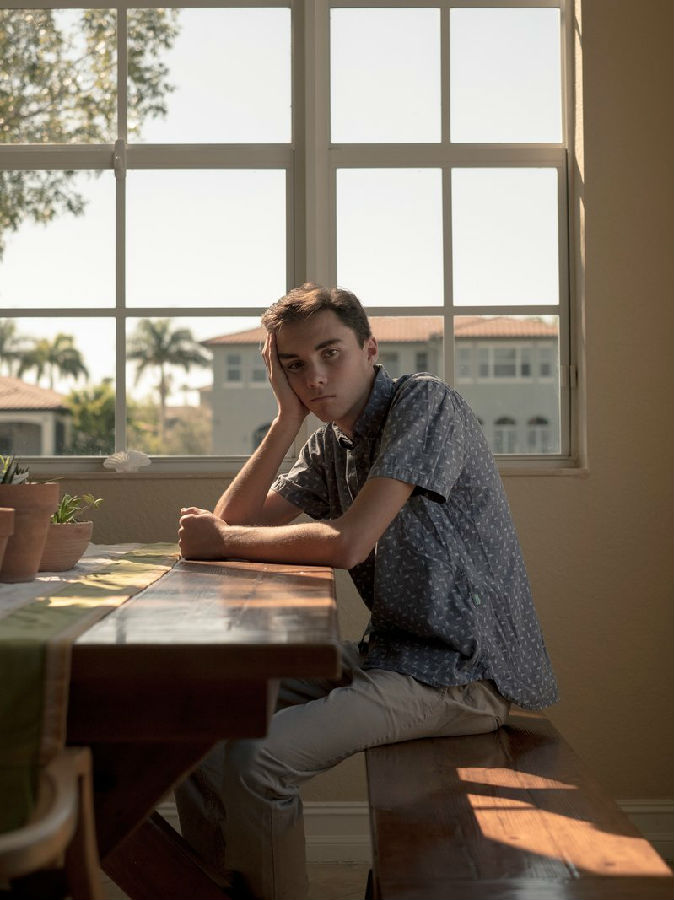Most of these kids cannot vote, order a beer, make a hotel reservation or afford a pizza without pooling some of their allowance.
這些孩子大多都還沒到能夠投票,能夠買啤酒,預(yù)訂酒店或者不用拼湊零花錢就能買得起比薩餅的年紀。
On the surface, they're not so different from previous generations of idealistic teenagers who set out to change the world, only to find it is not so easy.
從表面上看,他們與前幾代那些一心想改變世界結(jié)果卻發(fā)現(xiàn)并沒有那么容易的理想主義青少年并沒有多大不同。
Yet over the past month, these students have become the central organizers of what may turn out to be the most powerful grassroots gun-reform movement in nearly two decades.
然而,在過去的一個月里,這些學(xué)生已經(jīng)成了近二十年來最強大的民間槍支改革運動的核心組織者。
For much of the rest of the country, numbed and depressed by repeated mass shootings, the question has become, can these kids actually do it?
對于在一次又一次的大規(guī)模槍擊事件中逐漸麻木而沮喪的全國其他地區(qū)的很多地方而言,問題是,這些孩子這次究竟能不能成事?
No one thinks it will be easy.
誰也不覺得改革會容易。
Gun violence in America is one of those problems that can feel truly hopeless.
美國的槍支暴力問題是那些能夠切實讓人們陷入絕望的問題之一。
The U.S. has only 4.4% of the world's population,
美國的人口只占世界人口的4.4%,
yet it accounts for roughly 42% of the world's guns, according to the comprehensive 2007 Small Arms Survey.
然而,2007年的小型武器綜合調(diào)查顯示,美國擁有的槍支占世界槍支的42%左右。
And roughly 31% of the world's mass shooters are American, according to a University of Alabama study.
而且,根據(jù)阿拉巴馬大學(xué)的一項研究,全世界約有31%的群眾槍擊事件的罪犯都是美國人。
Even as mass-shooting deaths mount, our Second Amendment has made gun rights a third-rail issue:
盡管大規(guī)模槍擊事件造成的死亡人數(shù)不斷增加,我們的《第二修正案》也還是將槍支權(quán)利問題排在了第三位:
roughly 90% of Americans agree on "commonsense" solutions like universal background checks,
約有90%的美國人同意采取普遍背景調(diào)查之類的“常識性”解決方案,
yet absolutists stand in the way of any meaningful action.
然而,絕對主義者們阻礙了任何有意義的行動。
After Adam Lanza killed 20 first-graders and six staff members at a Connecticut elementary school in December 2012, politicians tried to tackle the issue.
2012年12月,亞當(dāng)·蘭扎于在康涅狄格州一所小學(xué)殺死了20名一年級學(xué)生和6名工作人員之后,政客們也試圖解決過這個問題。
President Obama issued Executive Orders to strengthen the background-check system and study gun violence, and several states tightened gun restrictions.
奧巴馬總統(tǒng)發(fā)布了行政令,鞏固背景調(diào)查系統(tǒng),研究槍支暴力,一些州也加強對槍支的限制。
Yet Congress failed to pass a modest bipartisan bill to close loopholes for gun sales.
然而,國會還是未能通過一項溫和的兩黨聯(lián)署法案來彌補槍支銷售的漏洞。

In the five years since, a familiar pattern has emerged.
在此后的五年中,一種大家熟悉的模式浮出水面了。
Every month or so, a killer shoots innocent people at random.
差不多每個月都會有一名兇手隨意射殺無辜的人。
There is a brief period of mourning.
之后,人們舉行短暫的哀悼。
Democrats offer feeble pleas for new gun limits; Republicans offer "thoughts and prayers."
民主黨人提出缺乏決斷的請愿,呼吁推出新的槍控措施;民主黨人則提供“一些思路和祈禱。”
No substantial laws are passed, and the nation moves on.
最后,沒有通過什么實質(zhì)性的法律,國家就對此事翻篇了。
This was the response when Omar Mateen killed 49 people at an Orlando nightclub in 2016;
奧馬爾·馬丁2016年在奧蘭多夜總會槍殺49人后的結(jié)局是如此;
when Stephen Paddock massacred 58 people at a Las Vegas concert last October;
斯蒂芬·帕多克去年10月在拉斯維加斯舉辦的一場音樂會上屠殺了58人后的結(jié)局是如此;
when Devin Patrick Kelley killed 26 people in a Sutherland Springs, Texas, church in November.
德文·帕特里克·凱利11月在德克薩斯州薩瑟蘭斯普林斯教堂殺死26人后的結(jié)局也是如此。
But in the days after the Parkland shooting, something diferent happened.
然而,帕克蘭槍擊案之后的幾天里,情況出現(xiàn)了變化。
The Parkland kids, at once tearful and cutting, publicly called out the NRA's inluence on national politics, and shamed the leaders they considered responsible for the nation's lax gun laws.
槍擊案發(fā)生后,帕克蘭的孩子們頓時淚流滿面也變得尖刻起來,他們公開指出了NRA對國家政治的影響,還公開掃了他們認為應(yīng)該對美國槍支法律太過寬松負責(zé)的那些領(lǐng)導(dǎo)人的顏面。
譯文由可可原創(chuàng),僅供學(xué)習(xí)交流使用,未經(jīng)許可請勿轉(zhuǎn)載。


